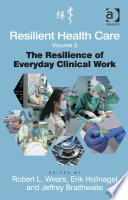
Resilient Health Care, Volume 2 The resilience of everyday clinical work
By - Wears, Robert L.; , Hollnagel, Erik,
Floor
-
Floor 1
Published
-
CRC Press, Boca Raton, Florida, 2015
ISBN 10 - 1472437829
ISBN 13 - 9781472437822
Book Status
-
5 Qnty Available with us.
Subject
-
Health Services Administration
Shelf No
-
19
Call Number
-
362.1068 RES
Physical Description
-
xxix, 295 pages
Notes
-
includes index and bibliography
Despite the common focus on deviations and failures in health systems, it is an undeniable fact that clinical work goes right far more often than it goes wrong, and that we only can make it better if we understand how this happens. This second volume of Resilient Health Care continues the line of thinking of the first book. It breaks new ground by analyzing everyday work situations in primary, secondary, and tertiary care to identify and describe the fundamental strategies that clinicians everywhere have developed and use with a fluency that belies the demands to be resolved and the dilemmas to be balanced.